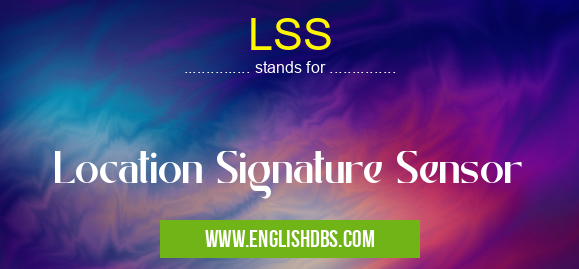What does LSS mean in CYBER & SECURITY
Location Signature Sensor (LSS) is a type of geographic sensor technology used to sense environmental conditions and transmit the data to be used for various purposes. This sensing technology provides real-time information about positional location and relative environmental conditions, allowing data collected to be used in a variety of industrial, commercial, military, and consumer applications.

LSS meaning in Cyber & Security in Computing
LSS mostly used in an acronym Cyber & Security in Category Computing that means Location Signature Sensor
Shorthand: LSS,
Full Form: Location Signature Sensor
For more information of "Location Signature Sensor", see the section below.
Applications
Location Signature Sensors are often found in applications such as asset tracking, traffic control systems, security surveillance systems, military operations, health care facilities monitoring systems, smart cities planning projects, unmanned aerial vehicles (UAVs) or drones operations etc. In addition to these, they are also extensively being employed in robotic navigation systems such as autonomous vehicles for providing them with real-time positional coordinates along with other parameters related to the surrounding environment such as temperature and humidity levels etc.
Advantages
The main advantages associated with the use of Location Signature Sensors is their ability to accurately track changes over time at any location due to their high accuracy rate compared to GPS devices or radars. Furthermore they are less expensive than GPS devices or radars that require costly hardware setup for routing information but still deliver same results while having lesser complexity at play.
Essential Questions and Answers on Location Signature Sensor in "COMPUTING»SECURITY"
What is a Location Signature Sensor (LSS)?
A Location Signature Sensor (LSS) is a sensing technology that allows for the localization of devices in areas where GPS and other traditional positioning technologies are not able to efficiently provide an accurate position. It is particularly useful for indoor location tracking, such as in large warehouses or shopping malls.
How does an LSS work?
An LSS works by taking readings of various environmental factors such as sound, light, temperature, and pressure to create a unique signature that can be used to determine the device's position with exceptional accuracy. This signature can then be matched against previously collected signatures in order to determine the device's location.
What are some of the benefits of using an LSS?
An LSS offers greater precision and reliability than other positioning technologies, especially indoors where GPS signals may be unavailable or unreliable. Additionally, it can provide up-to-date data about environmental conditions in real-time, which can be valuable for predicting equipment failure as well as helping map out indoor layout.
What kind of applications can an LSS be used for?
An LSS can have many different applications depending on the needs of each specific project. Examples include indoor navigation and mapping, asset tracking inside warehouses or factories, security camera control systems for crime prevention and access restriction purposes, and real-time occupancy monitoring for safety purposes.
Does an LSS require network coverage?
No; an LSS uses its own sensors to collect data, so it does not rely on any type of network coverage in order to function accurately. However, it may need some kind of wireless connection in order to transmit the collected data back to a database or server located remotely.
Are there any special requirements when using an LSS?
Yes; since it relies heavily on its sensors for accuracy, the environment must be suitable for taking regular readings – noise levels should not exceed certain levels and there should not be too much obstruction from walls or other objects blocking the sensor’s view. Additionally, frequent calibration may be required depending on the situation at hand.
Does an LSS need constant power supply?
Generally speaking no; only when actively capturing data from its sensors will power consumption increase significantly beyond what normal levels are with occasional updates being transmitted over standard Bluetooth connections needing very minimal energy consumption otherwise.
LSS also stands for: |
|
| All stands for LSS |
